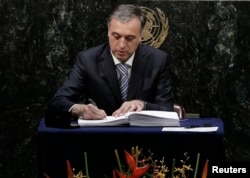Soon after President-elect Donald Trump's nominee for secretary of state, Rex Tillerson, left the hot seat in the Senate Foreign Relations Committee confirmation hearings, the committee voted in a business meeting to advance Montenegro's bid to join NATO to the Senate floor.
In December, the Senate failed to approve the treaty unanimously. Two Republicans — Senators Rand Paul of Kentucky and Mike Lee of Utah — objected to the move. According to VOA sources, Paul was not present at the Wednesday business meeting.
A Foreign Relations committee source said Montenegro's NATO treaty "heads now to the full Senate, but that manner is not clear yet." International treaties are approved by a two-third's majority.
Assurances of U.S. support
Senator John McCain, a Republican from Arizona, assured Montenegro's Prime Minister Dusko Markovic via phone that the U.S. Senate will ratify Montenegro's Accession Protocol to NATO soon, according to a statement released by the Montenegrin government press service. During the call, McCain also said a group of U.S. senators will visit Montenegro as soon as possible.
Also Tuesday, Italy and Norway joined 19 other members of the alliance that already have finalized their approval of Montenegro's accession to NATO, which means 21 of 28 alliance allies have officially backed the move.
NATO endorsed the Balkan country's accession bid at its July conference in Warsaw. The endorsement of U.S. lawmakers could signal others to give the green light for the expansion through their own legislative action.
In an interview with VOA's Serbian Service last month, Montenegro's President Filip Vujanovic said he hoped his country's membership in NATO will be formalized in the first half of 2017. "For us," he said, "it is important that the U.S. Senate ratifies the Accession Protocol."
Russian opposition
Russia opposes NATO expansion and, therefore, Montenegro's accession.
Moscow is suspected of involvement in a failed October coup plot to install a pro-Russian government and derail NATO expansion in the Western Balkans. Montenegro's acceptance would be the first since Croatia and Albania were admitted in 2009.
Allegedly, suspects arrested in the failed coup attempt on Montenegro's Election Day had connections with Russian intelligence elements, and some of them fought with Russia-backed separatists in Ukraine. They were, the state prosecutor said, planning to attack the parliament and assassinate the pro-Western prime minister.
Experts on European security are somewhat anxious to see if Trump's policy toward Russia will adversely impact Montenegro's NATO bid.
But the president of Montenegro believes the Trump administration's policy toward the Balkans likely will remain focused on stability, economic development, and European and NATO integration of the region. Vujanovic also hopes Montenegro's relations with Russia will improve once the country officially comes under the NATO flag.
"We are in some ways already in NATO," Vujanovic said. "Russia has voiced its well-known objection to NATO expansion. Montenegro needs to be patient and wait until it officially becomes a full member of NATO. After that, I hope our relations with Russia will improve, because Russia cooperates with, and has good relations with, many NATO countries."
This report was produced in collaboration with VOA's Serbian Service.





